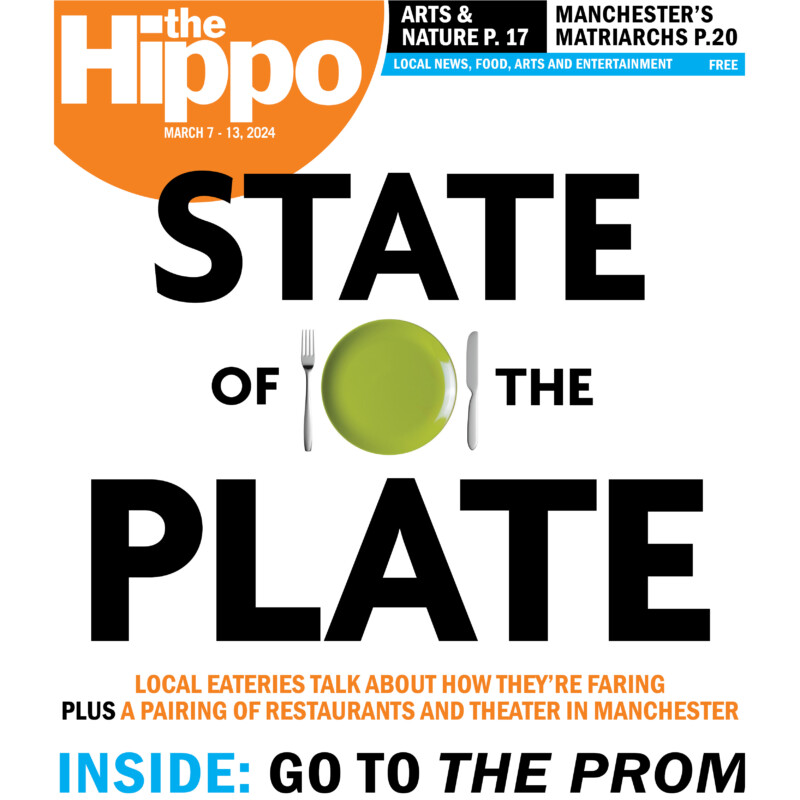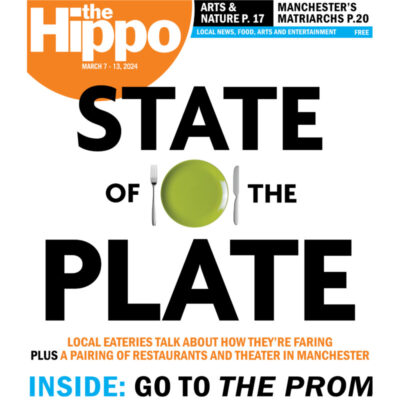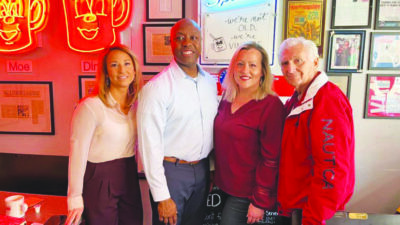Year: 2024
State of the Plate – 03/07/2024
12 In this week’s cover story, John Fladd asks area restaurateurs how it’s going as we approach the four-year anniversary of the 2020 Covid-related upheavals. We also take a look at Manchester’s Restaurant week, inspired by…
Also on the cover The Prom — the Palace Theatre’s latest musical. Michael Witthaus offers details on the production, which runs through March 24, in the story on page 16.
Zachary Lewis talks to the artist behind the soon-to-open show at the NH Audubon’s McLane Center in Concord (see page 17).
Zachary also gets the details on the Millyard Museum’s Afternoon Tea with Manchester’s Matriarchs (page 20).
Click to read our E-Edition PDF for FREE.
Our advertiser supported e-edition will always be free to view and download.
Making the pieces fit
Slim Volume on the rise
Blending elements of alt country and harmony-rich classic rock, Slim Volume is a breath of fresh air on the local music scene. At the core of the four-piece band is the songwriting team of Trent Larrabee and Jake DeSchuiteneer, who met as coworkers at SNHU’s Manchester campus, bonded over a shared love of ’60s bands, and found their mojo at Strange Brew Tavern’s open mic night.
With the addition of Mike Morgan on guitar and, soon after, drummer Jonny Lawrence, they picked a name and began playing whatever bar, basement or party would have them, polishing their sound while writing a growing list of original songs. Their sound isn’t easily pinned down — the Jake-written “It’s Been Sweet” echoes “Take It to the Limit” from the Eagles, while Trent’s composition “Talk it Over” is a lovely slice of dream pop wrapped in Tom Petty jangle.
Ever present, however, is the pair’s lush harmonizing. This comes through in the covers they choose. A mid-February listening room show at The Livery in Sunapee included no fewer than four Beatles tunes — “The first song we learned together was ‘This Boy,’” Trent said from the stage — and “Dream” from the Everly Brothers.
Other influences include Wilco and Pavement, along with contemporaries.
“A lot of local bands inspired me the most,” Trent said in a recent phone interview. He specifically cited Evan Benoit and his band Badfellows, now called Happy Just to See You, and Great White Tourist. “Just the whole Manchester music scene from 2015 to 2017 was super influential on me because I was still living in a Beatles/Bob Dylan paradigm that I had not really broken out of yet.”
The duo’s vocal connection began with Trent teaching himself Ricky Skaggs’ “You’ve Got a Lover” and Jake deciding to come in on top of the vocal. “I remember we noticed that it worked, and Trent being like, ‘You should do more of that type of thing,’” Jake recalled. “My voice does things Jake can’t and he does things mine doesn’t really do,” Trent agreed. “They definitely complement each other in that way.”
Trent had played in a few other bands before meeting Jake, who was just starting to explore taking his interest in music to another level. Working together on Trent’s 2021 solo album Billions of Musics helped Jake’s songwriting to grow. It’s led to a collaborative process that usually starts with one or the other writing a nearly complete song and then taking it to the band for fine tuning.
“I was inspired by the fact that Trent seemed to be finishing songs [that] had something to say and were interesting from start to finish,” Jake said. “That kind of helped me to see my way toward doing more, because a lot of what I’d done at the time was just writing stuff on my own, with really no intention of any audience hearing it.”
They’ve released one EP, Staring at the Sun, and a handful of singles. They have two more finished EPs, set to drop later this year. Each represents a different side of the group, Trent said. “One is more indie rock, and the other is our indie soul folk kind of sound. So that’s going to be a great display of, I don’t want to say the polarities of our music, but the range and spectrum of what we do.”
They’re also at work on their first full-length album with, noted Trent, an embarrassment of riches facing them.
“We have so much material, it’s really become a problem,” he said. “We can keep doing singles and EPs forever, but putting 10 or 12 songs together is really more important. It’s helped us focus [and] filter songs through the lens of what’s going to be good on an album, what’s going to fit together sonically, and what’s going to be the most accessible to an audience.”
Jake agreed. “I think we’re really starting to circle the target on what our sound, Slim Volume original music sounds like,” he said. “It’s a little bit indie rock, a little bit folk rock, sometimes it’s a little pop, sometimes it’s soulful. I think the album is gonna really show in a cohesive way what that range is.”
Slim Volume
When: Saturday, March 2, 5 p.m.
Where: Twin Barns Brewing, 194 Daniel Webster Hwy., Meredith
More: slimvolumeband.com
Featured photo: Courtesy photo.
The Music Roundup 24/02/29
Local music news & events
• Broadway bash: Four actors who’ve all starred in Phantom of the Opera gather for The Four Phantoms In Concert. The show, soon to be a PBS special, has both solo and group numbers from Brent Barrett, John Cudia, Franc D’Ambrosio and Ciarán Sheehan. It includes an appearance by Kaley Ann Voorhees, who played Christine in Phantom’s Broadway production. Thursday, Feb. 29, 7 p.m., Capitol Center for the Arts, 44 S. Main St., Concord, $48.75 and up at ccanh.com.
• Hammer time: He’s popular enough to fill hockey rinks, but Tom Segura’s dark humor isn’t for everyone. He told mLive.com in October his current tour is “bigger and blacker than anything I’ve ever done, but that name has already been used; Come Together gets the point across. Let us all come together for a night. ” Friday, March 1, 8 p.m., SNHU Arena, 555 Elm St., Manchester, $35.50 and up at snhuarena.com.
• Mixed media: Standup comedy preceded by jazz music is on tap at a show topped by Kenny Rogerson, billed as “the funniest man you’ve never heard of,” along with Steve Scarfo and Jayson Martin. Rogerson is well-known to regional fans; he’s appeared in Las Vegas and Atlantic City, and has made appearances on Letterman, Conan O’Brien and Comics Come Home. Saturday, March 2, 7 pm., Rockingham Ballroom, 22 Ash Swamp Road, Newmarket, $25 at eventbrite.com.
• New Englander: No soundtrack of 1970s Boston is complete without Jonathan Richman, who yearned to “drive past the Stop n’ Shop with the radio on at night” on “Roadrunner” and wrote a love song to Government Center. These days, he’s a crooner who eschews his oldies for an ever-changing setlist of music that “works well in quiet places,” backed by Tommy Larkins. Sunday, March 3, 7 p.m., Nashua Center for the Arts, 201 Main St., Nashua, $39 and up at etix.com.
• Rap deconstructed: For anyone interested in the songwriting process of hip-hop, Cody Pope and Brian G will break it down during an Inside the Music presentation. Sure to come up in the discussion is the duo’s work in progress, a follow-up to 2021’s Meet Me In Gate City, and thoughts on their creative influences, which include Pete Rock & C.L. Smooth, Gang Starr and Kool G Rap. Monday, March 4, 7 p.m., Nashua Public Library, 2 Court St., Nashua, nashualibrary.org.
Drive-Away Dolls (R)
A pair of friends, one recently dumped by her girlfriend and one getting burned out at work, decide to take a road trip and become unwitting participants in a caper involving a group of tough guys and a couple of suitcases in the 1999-set Drive-Away Dolls.
Marian (the always fun Geraldine Viswanathan) is prickly at work and seems sort of exhausted by the idea of a romantic life, hers having petered out after a breakup with a serious girlfriend (who 1990s-ily worked for Ralph Nader) years earlier.
We learn Jamie’s (Margaret Qualley) whole deal while she’s in bed with one girl and on the phone with her live-in girlfriend Sukie (Beanie Feldstein). When Sukie kicks Jamie out of their apartment, Jamie decides that she will accompany Marian on an impromptu road trip to Tallahassee. Marian’s plan is to visit an aunt and do some birdwatching. Jamie’s plan is that they hit as many lesbian bars on the drive down as they can. Both of them decide to take the trip in a “drive-away” — a car-share-type situation where they drive down a car that someone else has asked to have transported.
As it happens, they show up at the drive-away shop declaring their desire to go to Tallahassee just after its owner, Curlie (Bill Camp), is told in a shadowy phone call to expect people to take a car, and a “package” hidden inside, to Tallahassee. He thinks Marian and Jamie are those people, which is how these two twentysomething-ish girls looking for relaxation and romance end up in a car with a BEEP and a briefcase full of BEEP in the truck.
We know something’s in the trunk but it would spoil a couple of enjoyably dumb moments to tell you what it is.
Initially, I found Qualley’s Jamie deeply aggravating, Juno’s Juno dipped in a coating of Pulp Fiction. There is purposefully cartoony and then there is the Texas accent and devil-may-care affectations of this character and I just wanted Jamie to calm down — a vibe that extended to the movie overall. But then, at about the halfway point, the movie started to click. It found the key that it was meant to be in; it got how to mix the stuff about Marian and Jamie — their individual issues, their friendship-and-maybe-more with each other — with the crime caper. It wandered fully into the land of nuttiness and it dragged Colman Domingo, Matt Damon and Miley Cyrus with it. It gave in, or maybe I gave in, to the 2020s approach to the 1990s-ish take on the 1970s dirtbag indie tone of it all.
And I found it all kind of cute, sweet even.
Drive-Away Dolls doesn’t quite fill its 84 minutes; there is some bagginess that I wish the movie could have filled with more character detail or humor or something other than the banter that feels particularly loud and heavy in the beginning. But by the end, this movie won me over. B-
Rated R for crude sexual content, full nudity, language and some violent content, according to the MPA on filmratings.com. Directed by Ethan Coen with a screenplay by Ethan Coen and Tricia Cooke, Drive-Away Dolls is an hour and 24 minutes long and is released in theaters by Focus Features.
Featured photo: Drive-Away-Dolls.
The Frozen River, by Ariel Lawhon
The Frozen River, by Ariel Lawhon (Doubleday, 432 pages)
Ariel Lawhon was in an obstetrician’s waiting room when she came across a story about Martha Ballard, an 18th-century midwife in Maine who is said to have delivered more than 800 babies without ever losing a mother — a remarkable record for anyone, even more so during that time period.
Lawhon tore out the article from the magazine she was reading and made a note on it: “Would make a GREAT novel!” Fifteen years later, The Frozen River tells that story — three-quarters based on historical record; the rest, as Lawhon describes it, “what could have happened.”
But it isn’t just the story of a midwife, but a true-crime mystery that is deeply New England, though written by a woman who lives in Tennessee.
It begins with the discovery of a body lodged in an iced-over river, “lips parted, eyes still widened in surprise.” After the corpse is pulled out and lugged to a local tavern, Ballard, a self-taught medical practitioner, is called to inspect it. She immediately recognizes the man: Joshua Burgess, implicated in the brutal rape of a pastor’s wife three months earlier. “I had hoped to see Burgess swing at the end of a rope for what he did, but dead is dead, and I’m not sad to hear the news,” Ballard, the narrator of the story, says.
It is clear to her that Burgess, despite where he was found, had not drowned. His injuries indicate hanging, and he is missing several teeth, among other gruesome injuries.
In the 1700s, when this story is set, Maine was not yet a state but part of the Massachusetts frontier. And while there was a judicial system of sorts, and men could be put to death when convicted of rape, such convictions were rare. Further complicating matters, the second person involved in the rape of Rebecca Foster was a judge, Colonel Joseph North, who lorded over official proceedings of the town.
So when Ballard recorded in her diary “Mrs. Foster has sworn a rape on a number of men,” this was a scandal of the highest order: “The people of Hallowell will be chewing on this bone for years.”
Ballard’s diary is central to the story; in fact, it’s the only reason we know about her at all. As recounted in the Pulitzer Prize-winning book by Laurel Thatcher Ulrich, A Midwife’s Tale (later made into a film), Ballard kept concise notes about her life and work from 1785 to her death in 1812. Lawhon draws from the diary to weave her imagined account of how events mentioned in Ballard’s notes played out, using flashbacks to build out her life before the rape, death and trial.
Although Ballard’s assessment of Burgess’s cause of death was accurate, when the case comes before Colonel North, he dismisses it and rules the death an accidental drowning. Immediately after, a girl who works for Rebecca Foster (the woman who was raped) comes before the judge to report fornication, as it has become known that Rebecca is pregnant — the timing of the pregnancy corresponding with the rape. Ballard, who knows the truth, can’t stand for this, and says in the courtroom that the judge is the other man involved in the rape.
This sets up a battle royale between Ballard and North that will ultimately resolve much differently in fiction than it did in real life. It is a protracted battle that involves fear that Ballard’s own son might have been involved in the death of Burgess, and Colonel North using every means at his disposal to try to destroy Ballard and her family, even taking the family’s mill.
Throughout, Lawhon shows us what it was like to be a formerly enslaved person freed in the Massachusetts territory, how women were then treated (Ballard, for example, could not testify about the rape without her husband present in the courtroom) and how disease and death were constant companions to the colonists. (One particularly poignant chapter describes how diphtheria, sometimes called the children’s plague, ran through the Ballards’ Massachusetts home before the couple moved to Hallowell.)
And of course, the weather is practically a character in itself. Although Lawhon compresses the timeline of events for her purposes, the story takes place in what was literally called “the year of the long winter” in Hallowell, as the Kennebec River was ice from November 1785 to the following April. The icy river is an ominous presence from the story’s beginning until its end, as is a silver fox that seems to serve as an omen, as well as a biology lesson — who knew that “silver foxes” are actually black?
Lawhon followed the historical record enough to make the story feel real, but she reveals in an author’s note at the end of the book the major ways in which her story and the truth diverge, and why. Readers signing up for The Frozen River should prepare to make an investment of time, not only for this slow-moving, densely detailed story, but also because they will then want to read A Midwife’s Tale. Those more impatient might want to wait for the inevitable movie. B —Jennifer Graham






















